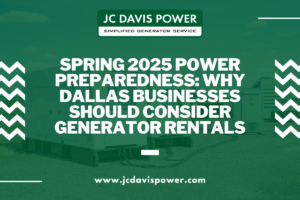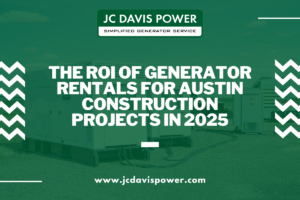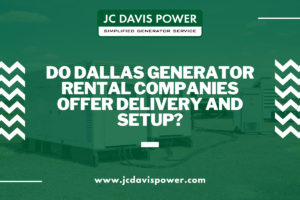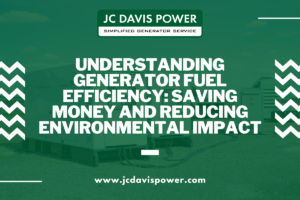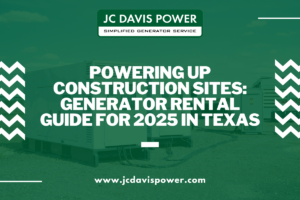What is Generator Efficiency?
Generator efficiency is a crucial concept for anyone operating power equipment on a worksite. It refers to how effectively a generator converts fuel into electrical energy. Improving generator efficiency is not just about saving money; it’s about optimizing performance and reducing environmental impact.
In worksite settings, where power demands can be high and continuous, even small improvements in efficiency can lead to significant cost savings over time. Efficient generators consume less fuel, produce fewer emissions, and generally have a longer operational life. This makes understanding and improving generator efficiency a key consideration for project managers and site supervisors.
Best practices for generator operation include proper sizing, regular maintenance, and optimal loading. By focusing on these areas, you can ensure that your generator is running at peak efficiency, providing reliable power while minimizing waste and operational costs.
Importance of Generator Lifespan
The lifespan of a generator is just as important as its efficiency. A longer-lasting generator means less frequent replacements, reduced downtime, and lower overall costs for your worksite. Several factors can affect a generator’s longevity, including usage patterns, maintenance routines, and environmental conditions.
Extending generator lifespan is about more than just avoiding breakdowns. It’s about maintaining consistent performance over time. A well-maintained generator will not only last longer but will also maintain its efficiency throughout its operational life. This means you can rely on consistent power output and fuel consumption rates, making it easier to plan and budget for your power needs.
Factors affecting generator longevity include:
- Frequency of use
- Load management
- Regular maintenance
- Environmental factors (temperature, humidity, dust)
- Fuel quality
By understanding these factors and taking steps to address them, you can significantly extend the useful life of your generator, ensuring a better return on your investment.
Tips for Improving Generator Efficiency
Fuel Efficiency Tips
Improving fuel efficiency is one of the most effective ways to enhance overall generator performance. Here are some practical tips to help you maximize your generator’s fuel efficiency:
- Choose the right fuel: Always use the fuel type recommended by the manufacturer. Using the wrong fuel can lead to poor performance and potential damage.
- Keep fuel fresh: Stale fuel can cause starting problems and reduce efficiency. Use fuel stabilizers if you need to store fuel for extended periods.
- Monitor fuel consumption: Keep track of how much fuel your generator is using. Sudden increases in fuel consumption can indicate efficiency problems that need addressing.
- Optimize load: Run your generator at 50-75% of its rated capacity for optimal fuel efficiency. Running at very low or very high loads can decrease efficiency.
- Use high-quality fuel: Premium fuels often burn cleaner and more efficiently, potentially offsetting their higher cost through improved performance.
By implementing these energy-saving techniques for generators, you can significantly reduce fuel consumption without compromising on power output.
Best Practices for Operation
To enhance generator performance and ensure proper load management, consider the following best practices:
- Warm-up and cool-down: Allow your generator to warm up for a few minutes before applying load, and let it cool down before shutting off. This helps prevent thermal stress on components.
- Avoid overloading: Never exceed the generator’s rated capacity. Overloading can damage the generator and reduce its lifespan.
- Use a power factor correction: If your worksite uses a lot of inductive loads (like motors), consider using power factor correction devices to improve efficiency.
- Regular exercise: Even when not in use, run your generator periodically to prevent fuel system issues and keep components lubricated.
- Monitor output: Regularly check the generator’s output voltage and frequency to ensure it’s operating within specifications.
By following these practices, you can significantly improve your generator’s performance and longevity while ensuring it meets your worksite’s power needs efficiently.
Extending Your Generator’s Lifespan
Routine Maintenance Checklist
Regular maintenance is crucial for keeping your generator running efficiently and extending its lifespan. Here’s a routine maintenance checklist to help you keep your generator in top condition:
- Oil changes: Change the oil according to the manufacturer’s recommendations, typically every 50-200 hours of operation.
- Air filter replacement: Check and clean the air filter regularly, replacing it when necessary to ensure proper air flow.
- Spark plug inspection: Check spark plugs for wear and replace them as needed, usually every 100 hours of operation.
- Fuel system check: Inspect fuel lines for leaks or damage, and clean or replace fuel filters as recommended.
- Battery maintenance: Keep battery terminals clean and check fluid levels in non-sealed batteries.
- Coolant check: For liquid-cooled generators, check coolant levels and condition regularly.
- Belt inspection: Check belt tension and condition, replacing worn belts promptly.
- Load bank testing: Perform annual load bank tests to ensure the generator can handle full capacity.
By following this maintenance checklist, you can significantly extend your generator’s lifespan and ensure it operates at peak efficiency.
Signs Your Generator Needs Maintenance
Recognizing when your generator needs maintenance can prevent minor issues from becoming major problems. Here are some common signs to watch for:
- Difficulty starting: If your generator is hard to start or won’t start at all, it may indicate fuel system issues or battery problems.
- Unusual noises: Knocking, rattling, or other unusual sounds can signal mechanical issues that need attention.
- Excessive exhaust smoke: Abnormal smoke can indicate problems with the fuel mixture or engine wear.
- Fluctuating power output: If your generator’s output is inconsistent, it may need alternator or voltage regulator adjustments.
- Increased fuel consumption: A sudden increase in fuel use can signal efficiency problems.
- Warning lights: Pay attention to any warning lights on your generator’s control panel.
- Oil leaks: Visible oil leaks indicate seal or gasket problems that need immediate attention.
If you notice any of these signs, it’s important to address them promptly. Many common generator issues can be resolved with simple fixes if caught early, preventing more serious and costly repairs down the line.
Remember, regular maintenance and prompt attention to these warning signs can significantly extend your generator’s lifespan and maintain its efficiency. For more information on generator maintenance and power solutions for your worksite, visit JC Davis Power. Choosing the Right Power Solutions for Your Worksite
Selecting Generators Based on Worksite Needs
When it comes to powering your worksite, choosing the right generator is crucial. Consider factors such as power requirements, portability, and fuel efficiency. Start by assessing your power needs – list all equipment that will be running simultaneously and calculate their total wattage.
For smaller jobs, portable generators might suffice. These are easy to move around and ideal for powering a few tools or lights. For larger worksites, you may need a standby or industrial generator. These can handle heavier loads and run for longer periods.
Don’t forget to factor in future needs. It’s often wise to choose a generator with slightly more capacity than you currently require to accommodate potential growth or additional equipment.
Safety Considerations with Generators
Safety should always be a top priority when using generators on your worksite. Here are some key considerations:
- Proper ventilation: Always operate generators outdoors to prevent carbon monoxide buildup.
- Electrical safety: Use proper cords and connections to avoid electrical hazards.
- Fuel storage: Store fuel safely away from the generator in approved containers.
- Regular inspections: Check for any damage or wear before each use.
- Training: Ensure all operators are properly trained in generator use and safety protocols.
Remember, a safe worksite is a productive worksite. Taking these precautions will help protect your team and equipment while maximizing efficiency.
Operational Tips to Enhance Performance
Operating Conditions That Affect Efficiency
Various environmental factors can impact your generator’s performance. Temperature, humidity, and altitude all play a role in how efficiently your generator operates.
In high temperatures, generators may struggle to cool effectively, potentially reducing output. Conversely, very cold temperatures can make starting difficult. Consider using a cold weather kit in frigid conditions.
Humidity can affect air density, which impacts combustion efficiency. High-altitude locations may require generators with special carburetor adjustments to compensate for thinner air.
Fuel type also matters. While gasoline is common, diesel generators often offer better fuel efficiency for longer run times. Natural gas generators can be a good choice for sites with access to gas lines, offering convenience and potentially lower fuel costs.
Troubleshooting Common Problems
Even with proper maintenance, you may encounter issues. Here are some common problems and quick fixes:
- Generator won’t start: Check fuel levels, battery condition, and spark plugs.
- Low power output: Ensure you’re not overloading the generator. Check for clogged air filters or fuel system issues.
- Frequent shutdowns: This could indicate overheating. Check cooling systems and ensure proper ventilation.
- Unusual noises: Strange sounds often signal mechanical issues. Stop the generator and inspect for loose parts or damage.
Remember, if you’re unsure about a problem, it’s best to consult a professional. Regular maintenance can prevent many of these issues before they start.
By understanding your worksite needs, prioritizing safety, and staying on top of operational best practices, you can ensure your generator performs efficiently and reliably for years to come.
